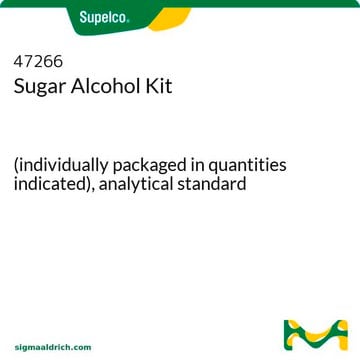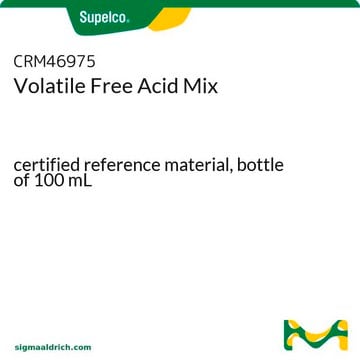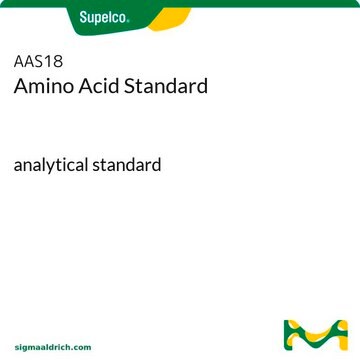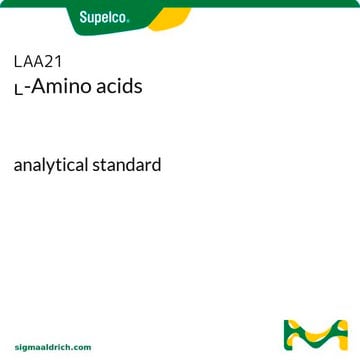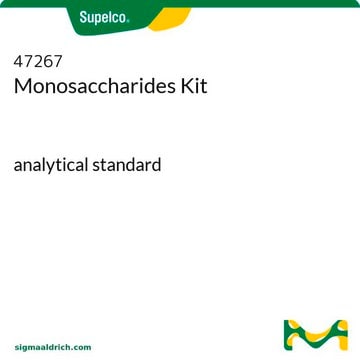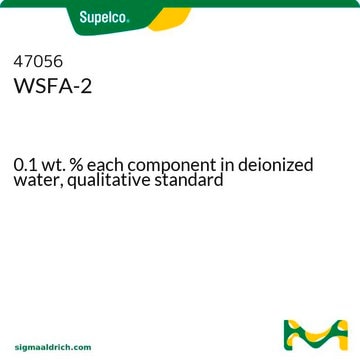47264
Organic Acids Kit
(individually packaged), analytical standard
About This Item
Polecane produkty
klasa czystości
analytical standard
Certyfikat analizy
current certificate can be downloaded
opakowanie
pkg of 1 kit
stężenie
(individually packaged)
metody
HPLC: suitable
gas chromatography (GC): suitable
Zastosowanie
cleaning products
cosmetics
food and beverages
personal care
format
neat
temp. przechowywania
-10 to -25°C
Powiązane kategorie
Opis ogólny
Zastosowanie
Tylko elementy zestawu
- Acetic acid 500 mg
- Adipic acid 500 mg
- L-Ascorbic acid 500 mg
- Benzoic acid 500 mg
- Butyric acid 500 mg
- Citric acid 500 mg
- Isobutyric acid 500 mg
- Formic acid 500 mg
- Fumaric acid 500 mg
- L-(+)-Lactic acid 100 mg
- DL-Isocitric acid trisodium salt hydrate 100 mg
- Maleic acid 500 mg
- Malonic acid 500 mg
- D-(+)-Malic acid 100 mg
- Oxalic acid 500 mg
- Phytic acid 500 mg
- Propionic acid 500 mg
- (-)Quinic acid 500 mg
- Succinic acid 500 mg
- Shikimic acid 100 mg
- D-(−)-Tartaric acid 500 mg
produkt powiązany
Hasło ostrzegawcze
Danger
Zwroty wskazujące rodzaj zagrożenia
Zwroty wskazujące środki ostrożności
Klasyfikacja zagrożeń
Acute Tox. 3 Dermal - Acute Tox. 3 Inhalation - Acute Tox. 4 Oral - Eye Dam. 1 - Flam. Liq. 3 - Skin Corr. 1 - Skin Sens. 1 - STOT RE 1 Inhalation - STOT SE 3
Organy docelowe
Lungs, Respiratory system
Zagrożenia dodatkowe
Kod klasy składowania
3 - Flammable liquids
Temperatura zapłonu (°F)
104.0 °F
Temperatura zapłonu (°C)
40 °C
Choose from one of the most recent versions:
Masz już ten produkt?
Dokumenty związane z niedawno zakupionymi produktami zostały zamieszczone w Bibliotece dokumentów.
Klienci oglądali również te produkty
Nasz zespół naukowców ma doświadczenie we wszystkich obszarach badań, w tym w naukach przyrodniczych, materiałoznawstwie, syntezie chemicznej, chromatografii, analityce i wielu innych dziedzinach.
Skontaktuj się z zespołem ds. pomocy technicznej

